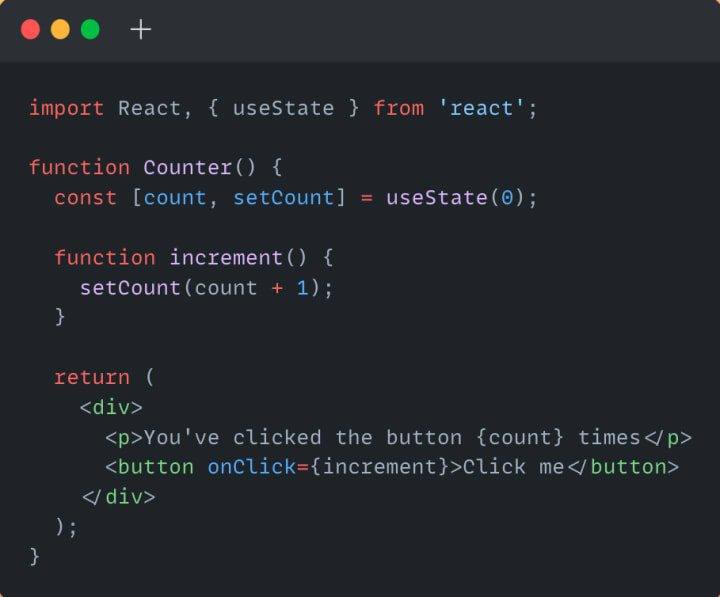Exploring Advanced Use Cases for useState Hook in React
Unlocking the Full Potential of useState: Discovering Advanced Applications in React

React’s useState hook is one of the most commonly used hooks in React functional components. It allows you to add a state to a component, without needing to use a class component or a global state management library like Redux. While the basic usage of useState is fairly straightforward, there are some advanced techniques and use cases that can take your React development to the next level.
Basic usage of useState
First, let’s review the basic usage of useState. Here's an example of a simple functional component that uses useState to keep track of a counter:

In this example, useState is used to create a state variable count, which is initialized to 0. The setCount function is used to update the count state when the button is clicked.
Advanced usage of useState
Now, let’s take a look at some more advanced use cases for useState.
1. Using an object or array as state
While useState can be used with primitive types like numbers and strings, and it can also be used with objects and arrays. Here's an example:

In this example, items is an array of objects, which is initialized as an empty array. The setItems function is used to update the items state by adding a new item to the array.
2. Using a function to set state
Normally, when you call setCount (or any other state setter function), React will queue a re-render of the component, and the new state will be used in the next render cycle. However, there's a more advanced usage of setCount that can take a function as an argument, rather than a value. Here's an example:

In this example, setCount is called a function that takes prevCount as an argument and returns the new count value. This has the benefit of ensuring that the new state is calculated based on the previous state, rather than the current state. This is important when you have multiple state updates that depend on the previous state.
3. Initializing state lazily
Sometimes, you may want to initialize the state of a component lazily, only when the component is actually rendered. You can accomplish this by passing a function as the argument to useState, instead of an initial value. Here's an example:

In this example, setData is called with a function that returns a promise that resolves with the data after a 3-second delay. This way, the data is only fetched when the component is actually rendered, rather than immediately when the component is mounted.
4. Using multiple state variables
You can use useState multiple times in a single component to keep track of multiple state variables. Here's an example:

In this example, two state variables are used: count and text. Each state variable has its own setter function and can be updated independently.
Conclusion
In conclusion, useState is a highly useful hook in React that allows developers to add state to their functional components. With its flexibility and advanced techniques, developers can build more powerful and interactive components without relying on complex class components or third-party libraries. By using useState to manage complex data structures, form data, or implementing more advanced state management patterns, developers can take their React development to the next level. So, whether you are a beginner or an experienced React developer, mastering the use of useState can help you build more efficient and enjoyable components.
About the Creator
FARDA KARIMOV
I'm a front-end engineer creating visually appealing and user-friendly web experiences. On Vocal Media, I share insights and advice on front-end development and design trends. Join me to explore the world of front-end development.






Comments
There are no comments for this story
Be the first to respond and start the conversation.